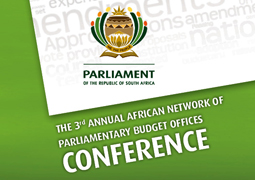
The Parliament of the Republic of South Africa is committed to be part of the African Union’s 2063 Development Agenda. Hosting of the African Network of the Parliamentary Budget Offices by the South African Budget Office is another indicator of that commitment, that was what the Speaker of the National Assembly, Ms Baleka Mbete, said when she delivered a word of welcome to the conference delegates of the third African Network of the Parliamentary Budget Offices at Parliament.
“We are happy to host you in the Mother City, Cape Town. Many of you travelled from abroad, from other continents, from Africa and long distances within the country, which serves to remind us how important it is for us to create a better and safer Africa in a better world,” said Ms Mbete.
Ms Mbete told the conference that they are satisfied with the impact that the South African Parliamentary Budget Office has made since its inception in 2013. “We will share our experiences with the setting up of our Parliamentary Budget Office and the successful implementation of the Office’s legislative mandate. But, we also want to learn from our esteemed guests from the African continent and beyond.”
Sharing with the conference an overview of what this oversight function entails and why the South African Parliament established the South African Parliamentary Budget Office, Ms Mbete said subsequent to the introduction of the budget, including the fiscal framework, the Division of Revenue Bill, the Appropriation Bill and tax and other revenue proposals, the fiscal framework and revenue proposals are referred to the committees on finance which are required to hold joint public hearings.
“This provision gives effect to the constitutional right to participate in the budget process. The process of referral, consideration, hearings, comments from the Minister if amendments are proposed to the fiscal framework, reporting and adoption by the respective Houses must be done within 16 days after the introduction of the fiscal framework,” she said.
She said after the adoption of the fiscal framework, the Division of Revenue Bill and the Appropriation Bill are referred to the Committee on Appropriations of the National Assembly to follow the legislative procedure as set out in the Constitution.
“In considering these Bills, the respective committees must also conduct public hearings, consult with other parliamentary committees, and allow affected Members of Cabinet, provinces and local governments to respond to the proposed amendments, as provided for in the rules.”
Ms Mbete said Revenue Bills, such as taxation Bills, are referred to the Committee on Finance of the National Assembly, and after approval, to the National Council of Provinces for consideration by its Committee on Finance.
In its support to Parliament, Ms Mbete said the Parliamentary Budget Office must also ensure that it supports the implementation of the Money Bills Amendment Procedure and Related Matters Act by undertaking research and analysis for the Finance and Appropriations committees in both Houses of Parliament. “And indeed, this is what the office is doing and many more initiatives, such as the analysis on the implementation of the National Development Plan, are making an impact on Parliament’s oversight role in transformation.”
The South African Budget Office is holding the 2018 3rd African Network of Parliamentary Budget Offices (AN-PBO) Conference. The AN-PBO was established in 2016 during the inaugural conference in Cape Town at Parliament. The purpose of the network is to bring together PBOs within the African continent and other stakeholders to discuss roles in support of the legislative oversight.
By Mava Lukani
22 August 2018

